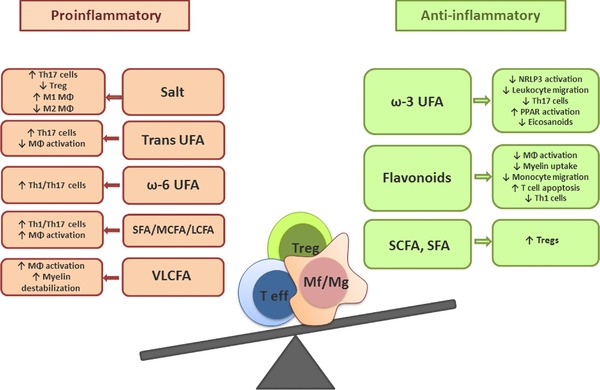Figure 1.

The impact of dietary fats, salt, and flavonoids on the immunopathogenesis of MS. Dietary factors are increasingly acknowledged to affect immune cell function in MS. For example, diets rich in salt and diverse fatty acids species, such as trans‐unsaturated fatty acids (UFAs), saturated fatty acids (SFAs), ω‐6 unsaturated fatty acids (ω‐6 UFAs), medium‐chain fatty acids (MCFAs), long‐chain fatty acids (LCFAs), or very‐long‐chain fatty acids (VLCFAs), induce TH1/TH17 cells and the inflammatory activation of phagocytes, such as macrophages and microglia. A diet rich in these nutritional factors may promote MS disease progression. In contrast, saturated short‐chain fatty acids (SCFA), ω‐3 unsaturated fatty acids (ω‐3 UFAs), and flavonoids may beneficially affect immune cell function in MS. Upon dietary consumption or after intestinal formation, SCFAs are reported to increase Treg cell differentiation and proliferation. ω‐3 UFAs may reduce inflammasome activation, the formation of inflammatory eicosanoids, TH17 cell numbers, and leukocyte migration into the CNS. In addition, ω‐3 UFAs can activate the anti‐inflammatory peroxisome proliferator–activated receptor. Plant‐derived flavonoids reduce phagocyte activation and migration, as well as the uptake of myelin by these cells. Furthermore, they may promote T cell apoptosis and the differentiation and proliferation of TH1 cells.
